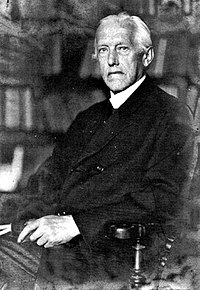Ulrich von Wilamowitz-Moellendorf
| Ulrich von Wilamowitz-Moellendorff | |
|---|---|
 |
|
| Born |
Enno Friedrich Wichard Ulrich von Wilamowitz-Moellendorff 22 December 1848 Markowitz, Province of Posen |
| Died | 25 September 1931 (aged 82) Berlin |
| Nationality | German Empire |
| Education | Schulpforta |
| Alma mater | University of Bonn |
| Scientific career | |
| Fields | Classical philology |
| Academic advisors | Otto Jahn, Hermann Usener, Anton Springer |
| Notable students | Jacoby, Mittelhaus, H. Fränkel, Schadewaldt, E. Fraenkel, Jaeger, Geffcken, Maas, Schwartz, Murray, Friedländer, Sykutris, Kranz, Pasquali, Cherniss |
Enno Friedrich Wichard Ulrich von Wilamowitz-Moellendorff (22 December 1848 – 25 September 1931) was a German classical philologist. Wilamowitz, as he is known in scholarly circles, was a renowned authority on Ancient Greece and its literature.
Wilamowitz-Moellendorff was born in Markowitz (Markowice), a small village near Hohensalza (Inowrocław), in the then Province of Posen (at present part of the Kuyavian-Pomeranian Voivodeship), to a Germanized family of distant Polish ancestry. His father, a Prussian Junker, was Arnold Wilamowitz, of Szlachta origin and using the Ogończyk coat of arms, while his mother was Ulrika, née Calbo. The couple settled in a small manor confiscated from a local noble in 1836. The Prussian part of their name, von Moellendorf, was acquired in 1813, when Prussian field marshal Wichard Joachim Heinrich von Möllendorf adopted Ulrich's ancestors. Wilamowitz, a third child, grew up in East Prussia.
In 1867 Wilamowitz passed his Abitur at the renowned boarding school at Schulpforta.
Until 1869 Wilamowitz studied Classical Philology at the University of Bonn. His teachers, Otto Jahn and Hermann Usener, had a formative influence on him. Willamowitz's relationship with Usener was strained. He developed a lifelong rivalry with his fellow student Friedrich Nietzsche and a close friendship with his contemporary Hermann Diels. Together with Diels, he moved to Berlin in 1869, where he graduated as a Doctor of Philosophy cum laude in 1870. After voluntary service in the Franco-Prussian War, he embarked on a study tour to Italy and Greece.
...
Wikipedia
